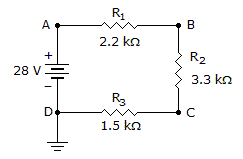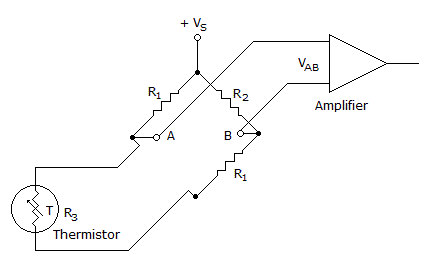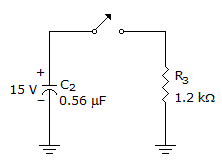Discussion
Home ‣ Electronics ‣ Flip-Flops and Timers See What Others Are Saying!
- Question
If an input is activated by a signal transition, it is _____________.
Options- A. edge-triggered
- B. toggle-triggered
- C. clock-triggered
- D. noise-triggered
- Correct Answer
- edge-triggered
- 1.

If R2 opens in the given circuit, what is the voltage at point B?
Options- A. +19.2 V
- B. +8.8 V
- C. +28 V
- D. ?19.2 V Discuss
- 2. ________ is an example of read/write memory.
Options- A. PROM
- B. EEPROM
- C. RAM
- D. MROM Discuss
- 3.

If the Wheatstone bridge is balanced in the given circuit, the voltage between points A and B (VAB) equals the source voltage (VS).
Options- A. True
- B. False Discuss
- 4. The three bipolar transistor circuit configurations are common-base, common-emitter, and emitter-follower.
Options- A. True
- B. False Discuss
- 5.

In the given circuit, the voltage across the capacitor 1 ms after the switch is closed is 11.61 V.
Options- A. True
- B. False Discuss
- 6. The weight of the LSB as a binary number is:
Options- A. 1
- B. 2
- C. 3
- D. 4 Discuss
- 7. In order to sustain oscillations in a feedback oscillator, the gain should be _________ so the Acl _______.
Options- A. reduced, equals one
- B. reduced, is less than one
- C. increased, is more than one
- D. increased, is much greater than one Discuss
- 8. In a common-base (C-B) amplifier, the output is 180 degrees out of phase with the input.
Options- A. True
- B. False Discuss
- 9. What is the inductive reactance if the Q of a coil is 60, and the winding resistance is 5 Ω?
Options- A. 0.083 Ω
- B. 12 Ω
- C. 30 Ω
- D. 300 Ω Discuss
- 10. A magnitude comparator outputs the highest or lowest value of its inputs depending on control signals.
Options- A. True
- B. False Discuss
More questions
Correct Answer: +28 V
Correct Answer: RAM
Correct Answer: False
Correct Answer: True
Correct Answer: False
Correct Answer: 1
Correct Answer: reduced, equals one
Correct Answer: False
Correct Answer: 300 Ω
Correct Answer: False
Comments
There are no comments.More in Electronics:
Programming
Copyright ©CuriousTab. All rights reserved.
